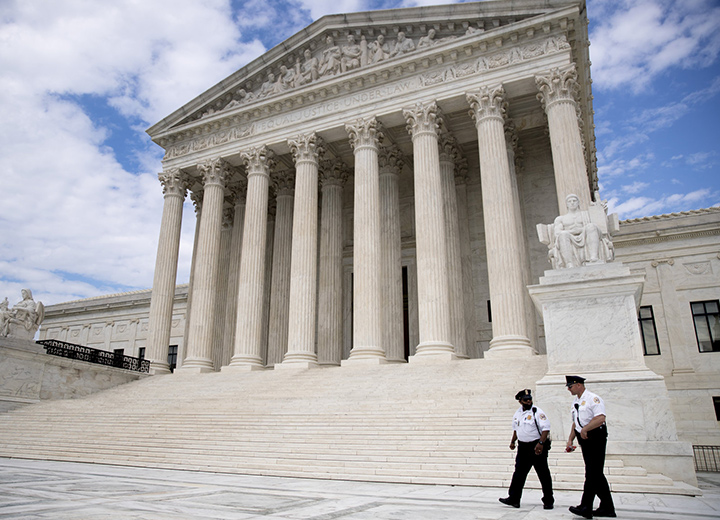Supreme Court: Montana Can’t Exclude Religious Schools From Scholarship Program
 Originally published on www.npr.org.
Originally published on www.npr.org.
The U.S. Supreme Court ruled that Montana’s exclusion of religious schools from a state scholarship program funded by tax credits violates the Constitution.
The 5-4 decision, in which Chief Justice John Roberts joined the court’s other conservatives, is a victory for parents who wanted to use the state tax credit to help send children to religious schools.
The decision is also a victory for conservative religious groups and advocates of school choice who challenged Montana’s “no-aid” provision in the state constitution.
The case began in 2015 when the Montana Legislature passed a bill providing a dollar-for-dollar tax credit for individuals who donate to organizations that provide scholarship money to students in private schools. An organization called Big Sky began raising money to fund these scholarships, using the tax credit as an incentive. Of the 13 schools that got scholarship money from Big Sky, 12 were religious schools. Indeed, 70% of all private schools in Montana are religiously affiliated. Poker Oyna , Youwin , Süperbahis
Ultimately, the Montana Supreme Court struck down the entire tax credit program for all private schools, religious and nonreligious alike. It said the tax credit conflicted with the state constitution, which bars all state aid for religious education, whether direct or indirect, including tax subsidies like this one.
School-choice advocates then sought to revive the scholarship program, appealing to the U.S. Supreme Court, backed by the Trump administration — including Education Secretary Betsy DeVos, who, as a private citizen and as a Cabinet member, has advocated for what she calls “faith-based education.”
Writing for the majority, Chief Justice Roberts asserted that “A State need not subsidize private education. But once a State decides to do so, it cannot disqualify some private schools solely because they are religious.”
In a dissenting opinion, Justice Ruth Bader Ginsburg rebutted Robert’s argument.
She wrote that “Because Montana’s Supreme Court did not make such a decision— its judgment put all private school parents in the same boat—this Court had no occasion to address the matter”
Lily Eskelsen Garcia, the head of the country’s largest teachers union, called the decision “shameful and unacceptable.” In a statement, she said “At a time when public schools nationwide already are grappling with protecting and providing for students despite a pandemic and mounting budget shortfalls, the court has made things even worse opening the door for further attacks on state decisions not to fund religious schools.”
But the ruling was cheered by some religious groups, and the White House. Press Secretary Kayleigh McEnany issued a statement saying “We celebrate today’s Supreme Court decision.” She said “The Trump Administration believes that school choice is a civil rights issue, and that no parent should be forced to send their child to a failing school.”
Andrea Picciotti-Bayer, legal adviser at the Catholic Association, called it “a welcome victory for religious freedom and countless American families,” adding that it will give “low-income students a chance to attend religious schools of their choice using state-endorsed private school scholarship funds.”
Baby Blaine amendments
The lead plaintiff is the case was Kendra Espinoza, who has two daughters attending the Stillwater Christian School in Kalispell, Mont. She is an office manager and staff accountant who works extra jobs to pay for her children’s tuition.
“I wanted my kids to have a really strong sense of right and wrong from a biblical perspective,” Espinoza said of her decision to send her children to a religious school. “I want them to understand that our sense of ethics and our morals come from God’s word, not just man’s ideas.”
At the heart of Tuesday’s case are what opponents of these “no-aid” provisions call “baby Blaine amendments,” named after James G. Blaine, who introduced a similar constitutional amendment in Congress in 1875. While the original amendment failed to pass, variations of it were adopted in most states. Many scholars today view the adoption of these amendments, mostly in the late 1800s, as a bigoted reaction to the mass immigration of Catholics into the U.S.
The state constitution
While the original no-aid provision was enacted in Montana in the 1880s, the current state constitution is no relic of the past. It was completely rewritten in 1972.
Indeed, almost all surviving delegates to the state constitutional convention submitted a brief in this case discussing how the “no-aid” provision was debated and enacted when the constitution was rewritten 48 years ago.
“There was clearly some interest being expressed on behalf of the parochial schools to open up the no-aid provision,” recalls Mae Nan Ellingson, one of the delegates. She says a daylong hearing was held, with some 100 witnesses presenting written and oral testimony, followed by an extensive debate on the no-aid provision.
Ellingson notes that “a number of ministers” who were convention delegates “spoke very ardently in favor of public funds not going to religious education.” And she says that ultimately the convention adopted the “no-aid” amendment in part “to protect religious liberty” and to prevent the state from attaching conditions to its aid.
In the end, the 1972 constitutional redo passed by a vote of 80-17. During the ratification campaign that followed, Ellingson says, the “no-aid” provision was “never even a threshold issue.” And she notes that the no-aid measure included a provision specifically allowing private religious schools to receive available federal funds through a state pass-through mechanism.
But in recent years, as the U.S. Supreme Court has grown more and more conservative, it has moved with increasing vigor away from the notion of a strict wall of separation between church and state and toward a greater accommodation of religion. It has, for instance, allowed states to provide vouchers to parents for use in both religious and nonreligious private schools. And several members of the conservative majority have viewed all the Blaine Amendments, whether they were enacted in the 1880s or in modern times, as evidence of discrimination against the free exercise of religion.
